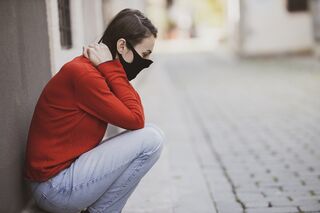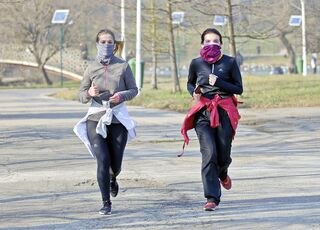Loneliness
Find a “COVID Buddy”
A buddy system combats loneliness and isolation.
Posted September 26, 2020

The deadliest pandemic of the 20th century, with a case fatality rate (CFR) estimated to be around 5 to 10% (usual flu is about .1%), was the Spanish Flu of 1918. It was caused by the H1N1 influenza A virus. The flu came in four waves and infected about 500 million people worldwide, though its origins are unclear. It lasted February 1918 to April 1920.
The current COVID-19 has morphed into a chronic pandemic. It has infected over 31 million people and killed almost 7 million yielding a case fatality rate of around 2% worldwide, a little less in the United States. Peter Hotez, dean of the National School of Tropical Medicine at Baylor has said “We may be in store for a very apocalyptic fall…”
As we await a potential “third wave” of COVID in the wake of schools opening, holiday seasons, and the intermingling of influenza season, we look for ways to endure the "hidden pandemic" of psychological distress associated with physical distancing, economic downturns, and the fear of becoming a COVID-19 statistic.
So what do we do? A wise person once said, “Control what you can, cope with the rest.” Physical exercise, mindfulness practices, pursuing a hobby, and changing scenery can all be effective coping techniques, but finding a “COVID Buddy” may be the most effective of all. I use the term “COVID Buddy” to refer to someone (a friend, neighbor, family member, co-worker) with whom you can share the psychological and social aspects of the pandemic. As John Donne noted in Meditation XVII, 1624, “No man is an island…” “Friendship makes prosperity more shining and lessens adversity by dividing and sharing it,” according to the philosopher Cicero.
Just to be clear, the term “COVID Buddy” does not mean finding someone with whom to share the infection! It’s all about providing mutual support in order to better cope with the psychological and social aspects of the pandemic.
The concept is drawn from the military. To combat evidence of growing distress in those serving in the U.S. Army, a “Battle Buddy” program was initiated around 2010. “Battle Buddies” were to be of assistance both in and out of combat situations. The “Battle Buddy” mutual aid partnerships of soldiers were designed to address feelings of stress and interpersonal disconnection. Initial reports supported its effectiveness. The University of Minnesota medical system is using a similar approach to support healthcare workers.

Choosing a “COVID Buddy”
Research has consistently shown that the support of others is the single best factor predicting human resilience. But choose your friends carefully. As Max Ehrmann famously noted, “Exercise caution…for the world is full of trickery" (Max Ehrmann, 1927, Desiderata). It seems to me that an effective “COVID Buddy” would have certain distinguishing qualities. So choose someone who is:
- Available. In other words, the strain of current events does not impact you on a predictable schedule. Your “COVID Buddy” should be someone you could call, email, or text most waking hours of the day or night.
- Reliably responsive. Your “COVID Buddy” should be someone who is not only available, but consistently responsive, responding within the same day.
- Trustworthy. Your “COVID Buddy” should be someone you can trust. To me, this means someone you feel comfortable confiding in and someone you can trust to keep your conversations confidential.
- A good listener. While listening is clearly an active process, it does not mean rushing to “fix” a problem. A good listener does not interrupt you when you are speaking, nor does a good listener finish sentences for you. A good listener uses enough silence so as to allow you to think about what you are saying, but not so much silence that it seems dismissive or uncaring.
- Capable of showing equanimity in difficult or stressful conversations. William Osler, the first physician-in-chief at Johns Hopkins Hospital, believed equanimity to be an essential skill for assisting others. Perhaps equanimity begets equanimity.
- Compassionately objective. Your “COVID Buddy” should be not only compassionate and supportive, but ideally an objective “sounding board.” Compassionate objectivity touches your heart but speaks to your mind.
- Courageous. Your “COVID Buddy” should be capable of telling you things you do not want to hear.
What of being an effective COVID Buddy yourself? I have described many of these characteristics in The Johns Hopkins Guide to Psychological First Aid, but one does not need a textbook to be an effective “COVID Buddy.” Rather, take these simple guidelines, apply them as best you can, and be the “COVID Buddy” you hope to find. As Christopher Robin once expressed to Winnie the Pooh, “Promise me you'll always remember: You're braver than you believe, and stronger than you seem, and smarter than you think.”
© 2020, George S. Everly, Jr., PhD


